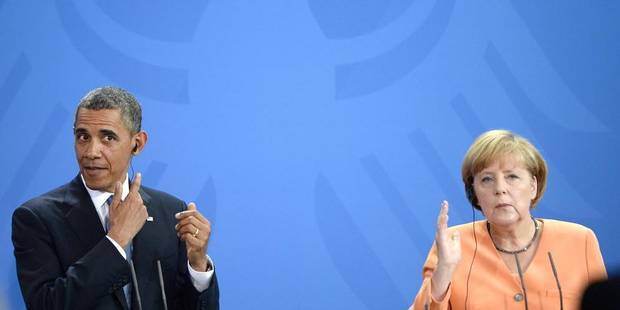
Credits -- JOHANNES EISELE / AFP
The US spy scandal keeps rumbling on. Last week, newspapers revealed NSA eavesdropping on millions of French and Spanish phone calls. Even Angela Merkel, the German Chancellor, had her phone calls listened in on. This comes at an awkward time for the US government, which has just started negotiations on TIPP, a major trade agreement with the EU, and for US IT and social networking companies that will fall under new data protection regulations from the EU. These regulations are being negotiated currently and their final outcome may reflect more on current privacy concerns than on the ease of doing business in the Common Market.
Google, Facebook, and Linkedin are just a few of the major US companies that may get caught out when the new regulations are decided. Lobbying has been intense in Brussels to find a framework that balances privacy with the directed advertisement that provide the bulk of search and social networking profits. Potential changes to the regulations in order to shield the networks from US snoops could involve costly server moves out of the US or additional privacy protocols, which may damage their ability to let 3rd parties access information, affecting their advertisement revenue.
Meanwhile, the US spy scandal may hit at Google and Microsoft more directly. The Brazilian government recently announced plans to set up a secure email system, not attached to any US based servers, to compete with Gmail and Hotmail and which would theoretically be more difficult for US spies to access. This would put the state mail carrier, Correios, in direct competition with the US multinationals. As yet, no European plans have cropped up for a similar system off US based servers.
Google, Facebook, and Linkedin are just a few of the major US companies that may get caught out when the new regulations are decided. Lobbying has been intense in Brussels to find a framework that balances privacy with the directed advertisement that provide the bulk of search and social networking profits. Potential changes to the regulations in order to shield the networks from US snoops could involve costly server moves out of the US or additional privacy protocols, which may damage their ability to let 3rd parties access information, affecting their advertisement revenue.
Meanwhile, the US spy scandal may hit at Google and Microsoft more directly. The Brazilian government recently announced plans to set up a secure email system, not attached to any US based servers, to compete with Gmail and Hotmail and which would theoretically be more difficult for US spies to access. This would put the state mail carrier, Correios, in direct competition with the US multinationals. As yet, no European plans have cropped up for a similar system off US based servers.
TTIP-ed off
However, the greater threat to the US and its international standing will not be in the lost profits to a few major US companies. The recent scandal has unearthed evidence of spying on the EU in Brussels and in Washington, DC as well as on several major European politicians. Whereas other spy efforts may be justified on national security grounds, US spying on EU communication or Chancellor Merkel’s phone make little military or anti-terrorist sense. Most EU states are strong NATO allies and Germany is a second tier military power, even in Europe. The benefits to national security over other US-EU intelligence sharing arrangements are minimal. European agencies currently share information, helping to identify terrorist sleeper cells and working with the US in both counter terrorism and military operations in Europe and abroad.
The main target then for US wiretapping in EU communiqués and leaders phones may be to gain advantages when dealing with the EU across the negotiating table. The US might benefit from sensitive information on the new free trade agreement currently being negotiated between the US and EU, the Transatlantic Trade and Investment Partnership (TTIP). Any internal information on red lines or negotiating tactics would be invaluable to the US team in striking the most advantageous deal for the US side.
But being found out comes at a cost. If the Europeans feel they are getting a raw deal, they may walk away from the agreement completely. The same applies for the Trans-Pacific Partnership that the US is negotiating with several major Asian and Latin American economies. The TTIP and TPP are of vital importance to the US at present, not just for economic growth but for geopolitical capture. They represent the last, best chance for the US to set global rules while China can still be safely excluded from them. With China set to overtake the US as the world largest economy as soon as 2020, the time to strike these deals is running out.
The main target then for US wiretapping in EU communiqués and leaders phones may be to gain advantages when dealing with the EU across the negotiating table. The US might benefit from sensitive information on the new free trade agreement currently being negotiated between the US and EU, the Transatlantic Trade and Investment Partnership (TTIP). Any internal information on red lines or negotiating tactics would be invaluable to the US team in striking the most advantageous deal for the US side.
But being found out comes at a cost. If the Europeans feel they are getting a raw deal, they may walk away from the agreement completely. The same applies for the Trans-Pacific Partnership that the US is negotiating with several major Asian and Latin American economies. The TTIP and TPP are of vital importance to the US at present, not just for economic growth but for geopolitical capture. They represent the last, best chance for the US to set global rules while China can still be safely excluded from them. With China set to overtake the US as the world largest economy as soon as 2020, the time to strike these deals is running out.

If the spying scandal undermines the US effort to ties its major allied economies to its economy, it will have a lasting and damaging impact on the country. While the EU would greatly benefit from the TTIP trade deal and still relies upon US for military support and any international action, the US will increasingly need the EU. The EU can help the US define international norms, boost legitimacy abroad, and support the current international system they have both developed since the end of the Second World War. Most importantly, the EU and US will have to work together to balance against rising challenges from developing nations who want a say in how the world is governed.
The US is used to getting its own way on the world stage. As the world largest economy and foremost military power, it is rightly called the “indispensible nation”. But it will need its allies to stay on top in the international arena for much longer. Given their common values, common history, and combined international weight, the US and EU are each other’s ideal allies. But the democratic values that they both treasure have consequences for their foreign policies and the French, German, and Spanish peoples will not be keen to have their phone calls listened in on by a foreign agency.
20 years from now, the United States neglect of its allies may be seen as an own goal, driving a wedge between the US and its main allies even as both of their global positions deteriorated. The row itself is trivial compared to the potential consequences of a halt to the further integration of the US and the EU, among other allies. The US spying programme will not bring it any benefits compared to what it is risking with its international alliances.
Lire cet article en français
The US is used to getting its own way on the world stage. As the world largest economy and foremost military power, it is rightly called the “indispensible nation”. But it will need its allies to stay on top in the international arena for much longer. Given their common values, common history, and combined international weight, the US and EU are each other’s ideal allies. But the democratic values that they both treasure have consequences for their foreign policies and the French, German, and Spanish peoples will not be keen to have their phone calls listened in on by a foreign agency.
20 years from now, the United States neglect of its allies may be seen as an own goal, driving a wedge between the US and its main allies even as both of their global positions deteriorated. The row itself is trivial compared to the potential consequences of a halt to the further integration of the US and the EU, among other allies. The US spying programme will not bring it any benefits compared to what it is risking with its international alliances.
Lire cet article en français






























